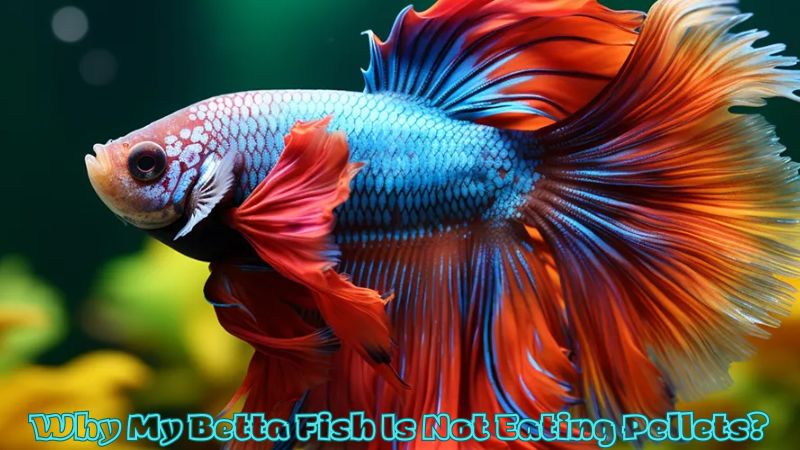Many betta fish owners face the occasional picky eater, and it can be concerning when your vibrant betta isn’t interested in their usual pellets. The reasons for this can range from simple preferences to underlying health issues. So why my betta fish is not eating pellets? Let’s Tropical Fish Haven delve into the possible causes behind your betta’s lack of appetite for pellets.
Why My Betta Fish Is Not Eating Pellets
Being Picky
It might sound unusual, but adopting a selective Betta fish is entirely possible. Their finickiness may not stem from you, but rather from their breeder or the pet store. Many breeders and stores start young Bettas on a diet of high-quality foods like frozen, freeze-dried, or live treats such as daphnia and brine worms.
These Bettas quickly grow accustomed to this gourmet diet and can be reluctant to switch. So, if your Betta fish refuses to eat pellets when you bring them home, it could be because they aren’t used to them. Bettas are known for being particular about their food choices. It may not be a health issue but simply a matter of them not recognizing pellets as food. This is especially common in Bettas accustomed to chasing live prey, as they often see food as something that moves.
The Environment
Another factor that might lead your Betta fish to reject pellets is their living environment. If the tank hasn’t been set up to mimic their natural habitat, it could cause them stress.
Similar to humans, stressed fish often lose their appetite. Additionally, some Betta fish are highly sensitive to changes in their surroundings. If they’re introduced to a new tank environment they’re not accustomed to, or if water conditions aren’t optimal, they may refuse to eat altogether.
Water Temperature
Another possible reason your Betta fish isn’t eating pellets could be related to the water temperature. Betta fish are tropical and thrive in warmer water conditions. Their metabolism is significantly influenced by water temperature.
If the water in your Betta tank is too cold, it can slow down their metabolism, leading to reduced appetite for all types of food.
A Sick Betta
Another possible reason why your Betta fish might refuse to eat pellets is illness. Factors such as water temperature being too cold, feeding incompatible foods, or overfeeding could diminish their appetite.
Your Betta might also be affected by either infectious or noninfectious health issues.
Overfeeding
Some bettas have voracious appetites and may consume more food than they can digest, so it’s crucial to monitor their feeding carefully. When overfed, bettas can experience gastrointestinal issues as excess food accumulates in their system. This can lead to severe bloating, requiring immediate attention. Any uneaten food left in the aquarium should be promptly removed using a net or gravel vacuum.
The Best Solutions to Try
Several approaches can be taken to encourage your Betta fish to eat pellets, many of which address the underlying causes mentioned earlier.
Wait It Out
If your Betta fish isn’t used to pellets, they might simply need time to adjust. If their refusal is due to being picky, they’ll likely begin eating once they become sufficiently hungry. To prevent issues with picky eating, it’s advisable to bring along some of the foods they’re accustomed to from the breeder or pet store when you first bring them home, and gradually transition them to pellets over a period of about two weeks or more.
Try Feeding Other Foods
You might want to experiment with other foods like flakes, live options, or various frozen varieties. It’s possible that your Betta fish simply doesn’t care for pellets.
Unfamiliar or Unsatisfied With Environment
If your Betta fish isn’t eating pellets because they’re unfamiliar with or displeased with their environment, it’s crucial to help them adjust. You can facilitate this by adding substrate, plants, and decorations that they favor.
Like all fish, Bettas should only be introduced to a cycled aquarium. They also prefer gentle currents and thrive with a sponge filter rather than strong ones.
Check the Water
If your Betta fish isn’t eating pellets due to water temperature issues, consider raising the temperature to boost their metabolism. It’s a good idea to invest in a water heater regardless. The optimal temperature range for Bettas is around 82.4°F (28°C).
If you observe any signs of illness such as unusual swimming patterns, erratic behavior, lethargy, or visible abnormalities, these could be reasons why your Betta fish isn’t eating. In such cases, it’s advisable to seek veterinary or expert advice for an accurate diagnosis. Once your Betta recovers, they will likely resume eating pellets.
How to Prevent Decreased Appetite
To ensure a happy and healthy Betta, house them in a heated and filtered aquarium, maintain proper water chemistry, and feed them a suitable diet. If you have any concerns regarding their health or care, reach out to a local aquatic veterinarian for assistance.
Conclusion
By considering the factors discussed above, you can determine the most likely reason your betta isn’t eating pellets and take steps to get them back on track. Remember, a healthy diet is crucial for your betta’s well-being, so addressing this issue promptly is important. If you’re still concerned after trying these suggestions, consulting a veterinarian or experienced aquarist can provide further guidance. Don’t forget to follow Tropical Fish Haven to update the latest articles





